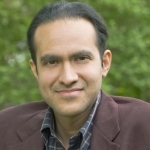 (HOST) Following a trip overseas to various developing countries, commentator and UVM Professor, Saleem Ali is considering attitudes about the giving – and receiving – of foreign aid worldwide.
(HOST) Following a trip overseas to various developing countries, commentator and UVM Professor, Saleem Ali is considering attitudes about the giving – and receiving – of foreign aid worldwide.
(ALI) Foreign aid has become an essential element of attempts to equalize obscene levels of global inequality. Having recently returned from Pakistan, I can say with confidence that American aid has definitely helped in saving lives of the nearly 20 million people impacted by floods there.
However, more caution is needed in understanding global aid flows and their impact and motivation. Zambian economist Dambisa Moyo has made a compelling case for dispensing with large development assistance altogether because of its poor record in Africa. While I disagree with such a drastic prescription, I am sympathetic to her concern about the motivation and sincerity of aid programs.
My concern was highlighted in mid-December when I attended a presentation by the new British minister for international development, Alan Duncan, at the Carnegie Endowment for International Peace in Washington. Duncan laid out his plans for British aid by downplaying concerns about mismanagement of funds by consultants and saying that the final outcome mattered and that the process of development assistance was secondary to the results achieved. This sounded the alarm for me. If one is not concerned about the process, then one is clearly not concerned about efficiency. This is precisely the kind of development culture which leads to waste.
I raised my hand during the short questions session. After introducing myself as a professor at UVM, I suggested to Mr.Duncan that aid programs might need to also reduce inequality within a country – otherwise there can be a perpetuation of civil conflict. True to his conservative roots, he was not sympathetic to any concerns about inequality and added with sarcasm: "Perhaps I should head to Vermont to learn about such concerns." Perhaps you should Mr. Duncan.
An attitude of impunity and arrogance pervades the global aid culture, and developing countries need to be more discerning and cautious about the terms of accepting aid. The lack of interest in dealing with inequality by stigmatizing concerns as ‘socialism’ or ‘utopianism’ is a serious issue in the global aid community and also in domestic politics within rich countries. We have a moral and historical obligation to help poor countries, particularly in Africa; and our assistance programs in comparison to expenditures such as defense are miniscule. However, any funds that we give must be tied to social reforms that ensure that the wealth gets better distribution across all sectors of society. As Congress considers funding for U.S. aid programs worldwide, it is important to approach this matter with great humility, foresight and compassion.